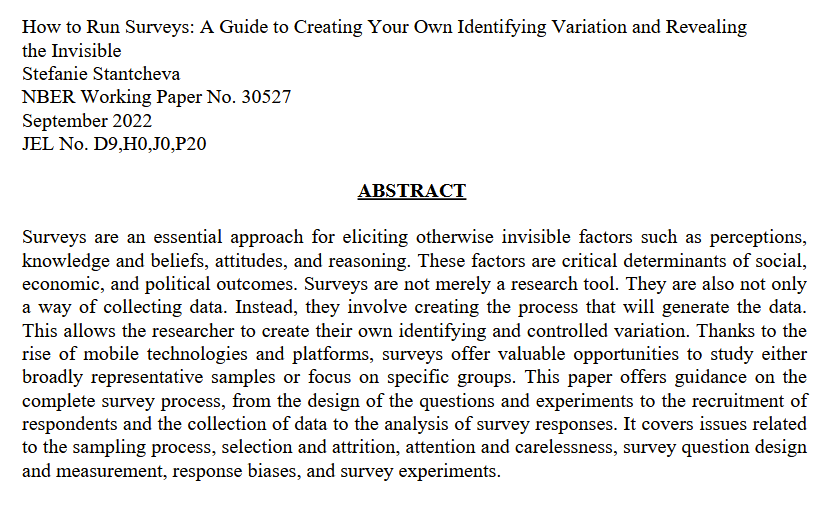1/19: Excited to share a paper on how people perceive & understand trade and trade policies!
Which factors shape the support for different trade policies? Thread below with the key takeaways #EconTwitter 🧵, and full paper here: scholar.harvard.edu/stantcheva/fil…
Which factors shape the support for different trade policies? Thread below with the key takeaways #EconTwitter 🧵, and full paper here: scholar.harvard.edu/stantcheva/fil…

2/19: The study tackles two key questions: what do people know about the impacts of trade? And, how do they weigh trade-offs when forming their views on trade policy? We conducted large-scale surveys and experiments in the US at the Social Economics Lab socialeconomicslab.org
3/19: In discussions of trade policy, it's important to think about both trade restrictions (e.g., tariffs or quotas) and compensatory redistribution to help those hurt by trade (e.g., retraining programs, direct transfers to displaced workers, support for low-income households).
4/19: The concept of trade involves numerous trade-offs (see the figure). People may care about the impacts on themselves (their self-interest) but also have broader economics and social concerns. 

5/19: Trade presents us with an interesting dilemma. We interact with it as consumers enjoying a variety of goods at competitive prices, and as workers whose job prospects might be affected due to competition from abroad, depending on one's occupation, industry, or education.
6/19: Beyond personal impact, people also consider broader societal effects. They think about economic outcomes, like efficiency gains and increased competition, and the distributional impacts on different social groups.
7/19: To measure these perspectives, I devised surveys capturing people's understanding of trade, views on its efficiency, distributional impacts, personal gains and losses, and their stance on trade policy interventions.
8/19: To confirm which factors sway people's views on trade policy, I incorporated experiments within the surveys. These included informational treatments explaining trade policy impacts, and priming treatments prompting reflections on personal trade impacts.
9/19: So, what are the key results? First, people perceive the threats and costs of job losses from trade to be acute and salient, whereas consumer benefits seem intangible and diffuse. It's the perceived job risks, not consumer gains, that influence people’s stance on trade. 

10/19: Second, people's views on trade are shaped not just by their material self-interest but by their concerns about its broader economic and social implications.
11/19: Many respondents believe in efficiency gains from trade in the form of higher competitiveness, innovation, and growth. 

12/19: But people are equally aware of trade's potential to exacerbate income inequality.
For instance, 60-70% of respondents believe that large corporations or high-income households gain from trade but 20% believe that low-income households or small businesses benefit from it.
For instance, 60-70% of respondents believe that large corporations or high-income households gain from trade but 20% believe that low-income households or small businesses benefit from it.

13/19: Those who believe that trade enhances productivity lean towards free trade. However, concerns about trade-induced inequality can suppress this support, unless they believe that the adversely affected can be adequately compensated.
14/19: Importantly, people who believe that compensatory policies exist don't oppose free trade, even if they acknowledge potential adverse distributional consequences. Instead, they support more redistribution to help those affected.
15/19: This illustrates that redistribution and compensatory transfers are key parts of trade policy. If policy makers want to sustain support for free trade, they need to ensure that fair redistribution is part of the plan, and this connection is well-understood by citizens.
16/19: Third, respondents' personal exposure to trade, both subjective and objective, influences their support for trade restrictions. This exposure shapes their assessments of how trade affects them and their perceptions of trade's broader impacts. 

17/19: Those who feel worse off due to trade, or are objectively more exposed to trade, are less likely to believe in the positive impacts of trade, like decreased prices, innovation, growth, or neutral distributional impacts. 

18/19: These results suggest that one's personal exposure to trade indirectly shapes their perceptions of trade's broader impacts, highlighting a key connection between personal experiences and broader policy perspectives.
19/19 You can find this study and many more on the Research page of the Harvard Social Economics Lab socialeconomicslab.org
• • •
Missing some Tweet in this thread? You can try to
force a refresh

 Read on Twitter
Read on Twitter














